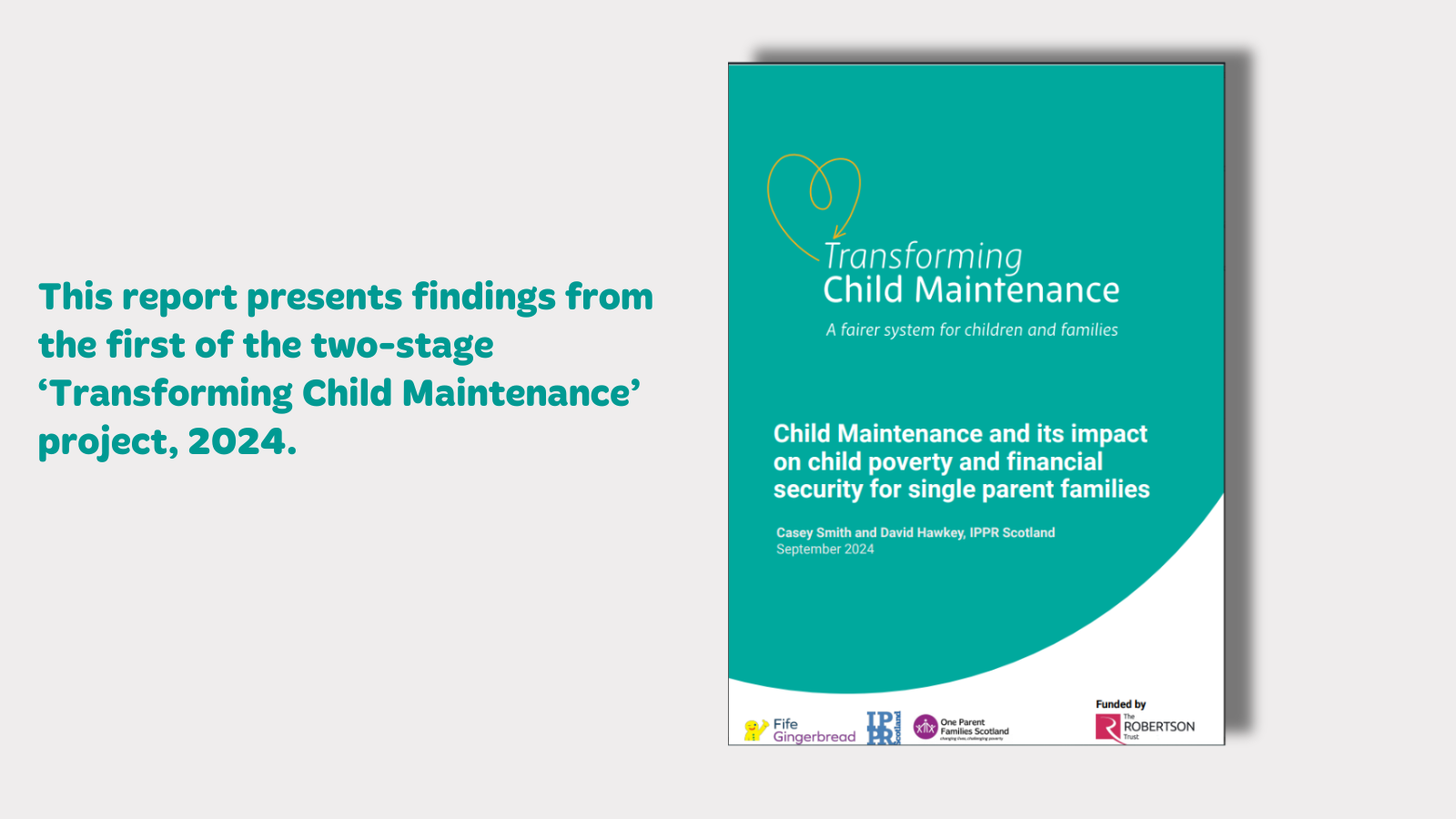Transforming Child Maintenance interim reports
Last updated: 14/10/2025
This interim briefing report from 2024, along with its four supporting annexes, provides an in-depth analysis of the current state of the UK Child Maintenance Service.
2024 - Child Maintenance and its impact on child poverty and financial security for single parent families
An in-depth analysis of the current state of the UK Child Maintenance Service.

1. Child Maintenance and its impact on child poverty and financial security for single parent families, September 2024
This report presents findings from the first of the two-stage ‘Transforming Child Maintenance’ project, based on quantitative and qualitative research including focus groups, public polling, expert consultations, and statistical analysis. This stage of research involved identifying the main issues with the current child maintenance system, as set out in this briefing paper, to inform readers and stakeholders of where reform is most urgent. The briefing paper serves to inform the next stage of the research which aims to develop ambitious policy recommendations for reform of the child maintenance system.
Download Interim Briefing report
2. The role of the existing child maintenance system in children’s financial security, September 2024
This report is a statistical analysis which delves into the Department for Work and Pension’s Family Resource Survey and Households Below Average Income dataset to examine the relationship between child maintenance the children’s financial security, particularly the impact on child poverty in the UK.
Download Role of child maintenance system in children’s financial security
3. Public opinion of the UK’s child maintenance system – polling results, September 2024
This slide package sets out the key findings from the polling commissioned by IPPR Scotland and conducted by Diffley Partnership. More than 1,000 adult parents in Scotland were polled in March 2024, with the aim of understanding the attitude of parents towards the current UK child maintenance system, what it should accomplish, and how it should work.
Download Role of child maintenance system in children’s financial security
4. Identifying ‘the problem’: Analysis of findings from Paying and Receiving Parent focus groups, September 2024
This analysis brings together the findings from focus groups with Paying and Receiving Parents, hosted by One Parent Families Scotland and IPPR Scotland, focused on identifying the various issues parents cite while reflecting on their experience with the child maintenance system.
Download Identifying the problem
5. Test and Learn: Understanding the approach to child maintenance in Fife: Evaluation Report, September 2024
This report evaluates a local level delivery model of child maintenance, developed and delivered by Fife Gingerbread. This approach is centred around providing tailored support intended to improve the experiences of families accessing child maintenance and to support families in Fife to successfully navigate the system to ensure children receive fair financial support. Additionally, the Evaluation explored the work around capacity building within the current financial inclusion eco-system to embed Child Maintenance in these conversations with lone parents.
Download Understanding the approach to child maintenance in Fife
2024 – Gingerbread releases new report and calls on on the UK government to ‘fix the CMS’.
Gingerbread’s Fix the CMS report, published in November 2024, is based on extensive feedback both from paying parents and parents with care. It shows that the CMS is not achieving its purpose, and too many children aren’t receiving the maintenance they deserve.
2023 – Gingerbread announces losing Judicial Review related to the CMS
In 2023, Gingerbread was granted permission from the courts to intervene in a legal case brought by a group of single parents in England to challenge the failure of the Child Maintenance Service (CMS) to take “proper or effective steps” to recover maintenance payments from absent parents.
2023 – Child Maintenance During a Cost-of-Living Crisis
This research was conducted by the Poverty Alliance with Fife Gingerbread. This work sought to provide understandings of families in Fife but provides insights that will have resonance and relevance across the UK
Download Child Maintenance During a Cost-of-Living Crisis2016 – Bairns Come First: Understanding Child Maintenance in Fife
This research sets to explore and understand the issue of child maintenance for individuals and services within the Fife area.
Download Bairns come first